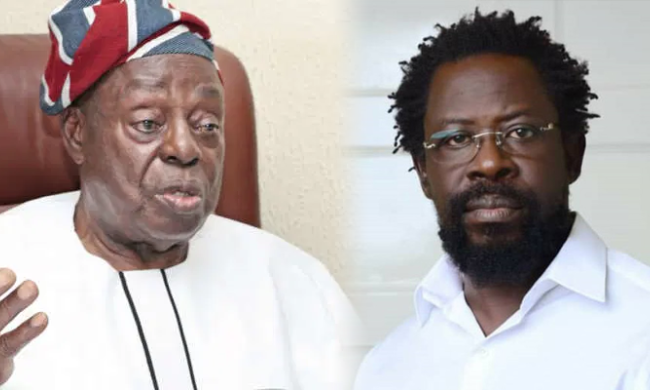In an unexpected turn of events that has captivated the nation, eminent Nigerian lawyer and founder of Afe Babalola University, Ado Ekiti (ABUAD), Chief Afe Babalola, has decided to forgive renowned human rights activist and lawyer, Dele Farotimi, after a high-profile intervention by six prominent Yoruba monarchs. This dramatic decision, which occurred late Sunday night in Ado Ekiti, has raised eyebrows across Nigeria, given the intense nature of the criminal defamation suit Babalola had filed against Farotimi.
The legal battle, which began in December 2024, saw Farotimi arrested by the Ekiti State police after publishing a controversial book titled Nigeria and its Criminal Justice System. In the book, Farotimi alleged that Babalola had corrupted the judiciary and influenced the Supreme Court to secure a revised judgment in his favor. These accusations triggered a criminal defamation lawsuit, leading to Farotimi’s arrest, prosecution, and subsequent three-week imprisonment before his bail was granted.
However, the situation took an unexpected turn on Sunday, when the Ooni of Ife, Oba Enitan Ogunwusi, accompanied by five other powerful monarchs from the Yoruba-speaking regions, visited Babalola’s residence in Ado Ekiti. The distinguished delegation included the Ewi of Ado, Oba Rufus Adejugbe Aladesanmi III; Ajero of Ijero, Oba Adewole Joseph Adebayo; the Ogoga of Ikere, Oba Samuel Adejinmi Adu; Alaaye of Efon Alaaye, Oba Dr. Emmanuel Aladejare Agunsoye II; and the Olojudo of Ido Ekiti, Oba Ilori Faboro, who also serves as the Chairman of the Ekiti Council of Traditional Rulers.
According to Moses Olafare, the spokesperson for the Ooni of Ife, the royal entourage arrived at Babalola’s home just after 10 p.m., bringing with them a collective message of reconciliation. The meeting, which lasted well into the early hours of Monday morning, was closed to the public, but its outcome was momentous.
A ‘Tough Son’ Pleads for Forgiveness
The Ooni of Ife, a prominent figure known for his traditional leadership and wisdom, spoke on behalf of the delegation. He appealed to Babalola’s sense of justice and Yoruba values, urging him to forgive Farotimi, whom he referred to as a “tough son” of the elder statesman.
“Aare Afe Babalola, you are an elder statesman, a man who has excelled in every area of life. You have built an impeccable legacy and are a shining example of what it means to be an Omoluwabi—someone who embodies the highest virtues of the Yoruba people,” the Ooni said. “As our father, you have soft sons and tough sons. Dele Farotimi is one of your tough sons, but he has made his point. Please, for the sake of your legacy and the values we cherish, forgive him.”
The Ooni’s words resonated deeply with Babalola, who, despite previous entreaties from figures such as former President Olusegun Obasanjo and Bishop Matthew Kukah, had resisted calls to drop the charges. The monarchs’ collective appeal, however, seemed to strike a different chord with the nonagenarian legal luminary.
A Dramatic Change of Heart
Babalola, who had been steadfast in his resolve to pursue legal action, appeared to soften as the royal delegation’s pleas grew more heartfelt. Reflecting on his upbringing and the longstanding respect he held for Yoruba traditions, Babalola declared that he would immediately instruct his legal team to withdraw the criminal charges against Farotimi.
“Today is a significant day for me,” Babalola said, his voice tinged with emotion. “I am a Yoruba man, and the values of our people are dear to me. In the past, I refused the appeals of many prominent Nigerians, but your coming here tonight has convinced me. I grew up learning to respect the wisdom of our elders, and today I must heed your advice.”
Babalola also recounted his personal history, emphasizing his rejection of government offers and rewards that could have compromised his integrity. He proudly stated that he had never won cases through corruption, rejecting lucrative oil deals and ministerial positions due to his commitment to ethical conduct.
“I have been accused of corruption, but I have never allowed it to define me,” Babalola explained. “I was offered an oil block, but I turned it down because I didn’t want my name to be tainted by such things. I was offered ministerial positions, but I rejected them because I don’t want anyone to say I made my wealth through corruption.”
The Role of Yoruba Ethos in the Resolution
At the heart of Babalola’s decision was the deeply rooted Yoruba ethos of communal harmony, respect for elders, and the importance of personal integrity. While his legal team had advised him to proceed with the case, Babalola ultimately recognized that continuing the lawsuit would not serve his interests.
“There is nothing I would gain from Dele Farotimi’s imprisonment,” Babalola admitted. “I am not seeking more wealth or fame. I have enough to live on comfortably. What matters to me is my legacy and my integrity. On this occasion, I say ‘yes’ to forgiveness.”
This decision not only marked a personal victory for Dele Farotimi, whose future now looks brighter, but also reinforced the powerful role of traditional institutions in mediating disputes and preserving social harmony in Nigeria. It also sent a clear message about the importance of reconciliation and the power of forgiveness, even in the face of severe public accusations.

